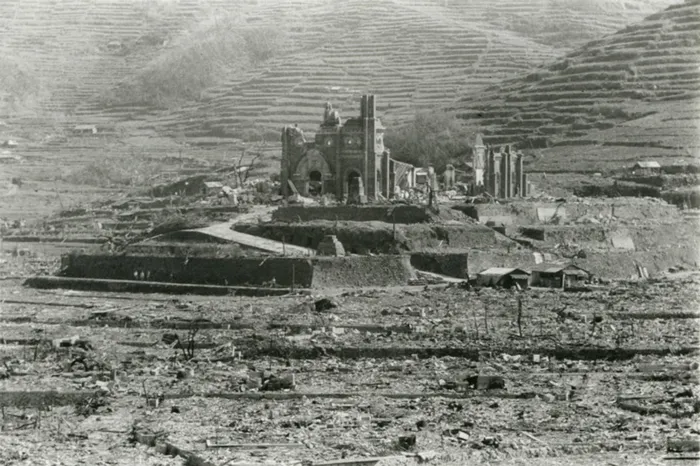Humanity is confronting new arms race, UN chief warns

Picture: Shigeo Hayashi/Nagasaki Atomic Bomb Museum/Handout via REUTERS – The Urakami Cathedral (C), which was destroyed by the atomic bombing of Nagasaki on August 9, 1945, is seen in Nagasaki.
Picture: Indranil Mukherjee/AFP/Taken on August 5, 2023 – Women participate in peace rally to mark the 78th anniversary of the atomic bombing of Hiroshima and Nagasaki at the end of WWII, in Mumbai on August 5, 2023.
By Jessica Corbett
Nearly eight decades after the US dropped an atomic bomb, codenamed “Fat Man”, on the Japanese city of Nagasaki, UN Secretary-General António Guterres was among the voices across the world renewing calls for eliminating nuclear weapons. In a message this week to the Nagasaki Peace Memorial on the 78th anniversary of the 1945 bombing, Guterres said the “ceremony is an opportunity to remember a moment of unmatched horror for humanity”.
“We mourn those killed, whose memory will never fade. We remember the terrible destruction wrought upon this city and Hiroshima,” he continued, referencing the Japanese city that had been bombed a few days before. “We honour the unrelenting strength and resilience of the people of Nagasaki to rebuild.
“And we recognise the brave hibakusha, whose powerful and harrowing testimonies will forever stand as a reminder that we must achieve a world free of these inhumane weapons,” he added, using the Japanese term for survivors of the World War II attacks. In their name and in memory of the devastation decades ago, Guterres has made eliminating nuclear weapons the UN’s highest disarmament priority – at a time when the world is facing fresh threats of nuclear war.

Without naming any nations, Guterres said that “despite the terrible lessons of 1945, humanity now confronts a new arms race. Nuclear weapons are being used as tools of coercion”. “Weapons systems are being upgraded, and placed at the centre of national security strategies, making these devices of death faster, more accurate, and stealthier. All this, at a moment when division and mistrust are pulling countries and regions apart. The risk of a nuclear catastrophe is now at its highest level since the Cold War.”
As in the Cold War, the US and Russia have by far the largest stockpiles of the nine nuclear-armed nations – though China is working to boost its arsenal. The other countries with nukes are France, India, Israel, North Korea, Pakistan and the UK. Fears of a potential nuclear catastrophe have ramped up since early last year, when Russia invaded Ukraine, which is receiving military and humanitarian aid from multiple countries, including the US. Leaders in Moscow have repeatedly made nuclear threats throughout the war. Citing a 2020 decree from Russian President Vladimir Putin, Dmitry Medvedev, a former president who is deputy chair of the country’s security council, said late last month that if Ukraine’s counter-offensive to force out invaders and reclaim territories was successful, “we would be forced to use a nuclear weapon”. Just days later, leading medical journals published a joint editorial warning that “current nuclear arms control and non-proliferation efforts are inadequate to protect the world’s population against the threat of nuclear war by design, error, or miscalculation”.
Noting that a US-Russia war involving nukes “could kill 200 million people or more in the near term and potentially cause a global ‘nuclear winter’ that could kill 5-6 billion people, threatening the survival of humanity”, the editorial stresses that “the prevention of any use of nuclear weapons is, therefore, an urgent public health priority” and advocates for abolition.
Guterres similarly said “We will not sit idly by as nuclear-armed states race to create even more dangerous weapons” and “the only way to eliminate the nuclear risk is to eliminate nuclear weapons”. “The United Nations will continue working with global leaders to strengthen the global disarmament and non-proliferation regime – including through the Treaty on Non-proliferation of Nuclear Weapons and the Treaty on the Prohibition of Nuclear Weapons,” pledged the UN chief. “We can never forget what happened here,” he added of the devastation in Japan. “We must lift the shadow of nuclear annihilation, once and for all. No more Nagasakis. No more Hiroshimas.”
Guterres was far from alone in using the sombre occasion to demand the abolition of nuclear weapons. A peace declaration Nagasaki mayor Shiro Suzuki read during the Wednesday ceremony, which was translated to English by The Mainichi, notes that the 1945 attack “stole the lives of 74,000 people by the end of the year. “The hibakusha who survived developed leukaemia, cancer and other diseases years and decades after the bombing battle, with suffering and anxiety due to the effects of radiation even now”.
Echoing Hiroshima mayor Kazumi Matsui’s speech on Sunday about the city’s bombing, the Nagasaki declaration asserts that “as long as states are dependent on nuclear deterrence, we cannot realize a world without nuclear weapons. Eliminating nuclear weapons from the face of the Earth is the only way to truly protect our safety”.
“Please visit the atomic bombing sites, see with your own eyes and sense the consequences of nuclear weapons. Please listen to the testimonies of hibakusha, a common inheritance of humankind that must continue to be talked about throughout the world,” said Suzuki. “Knowing the reality of the atomic bombings is the starting point for achieving a world without nuclear weapons and could also be the driving force for changing the world.”
Corbett is a senior editor for Common Dreams. This article was first published on Common Dreams